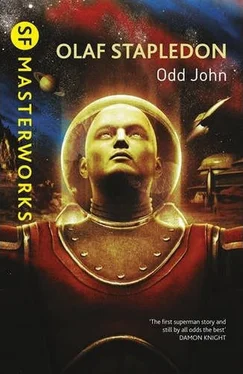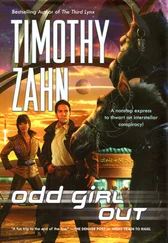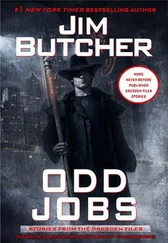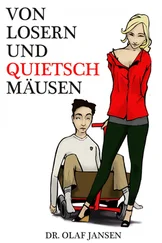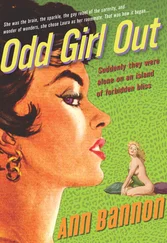Olaf Stapledon - Odd John
Здесь есть возможность читать онлайн «Olaf Stapledon - Odd John» весь текст электронной книги совершенно бесплатно (целиком полную версию без сокращений). В некоторых случаях можно слушать аудио, скачать через торрент в формате fb2 и присутствует краткое содержание. Город: London, Год выпуска: 2012, ISBN: 2012, Издательство: Hachette UK, Жанр: Фантастика и фэнтези, на английском языке. Описание произведения, (предисловие) а так же отзывы посетителей доступны на портале библиотеки ЛибКат.
- Название:Odd John
- Автор:
- Издательство:Hachette UK
- Жанр:
- Год:2012
- Город:London
- ISBN:9780450038570
- Рейтинг книги:5 / 5. Голосов: 1
-
Избранное:Добавить в избранное
- Отзывы:
-
Ваша оценка:
- 100
- 1
- 2
- 3
- 4
- 5
Odd John: краткое содержание, описание и аннотация
Предлагаем к чтению аннотацию, описание, краткое содержание или предисловие (зависит от того, что написал сам автор книги «Odd John»). Если вы не нашли необходимую информацию о книге — напишите в комментариях, мы постараемся отыскать её.
Odd John — читать онлайн бесплатно полную книгу (весь текст) целиком
Ниже представлен текст книги, разбитый по страницам. Система сохранения места последней прочитанной страницы, позволяет с удобством читать онлайн бесплатно книгу «Odd John», без необходимости каждый раз заново искать на чём Вы остановились. Поставьте закладку, и сможете в любой момент перейти на страницу, на которой закончили чтение.
Интервал:
Закладка:
“Then tell me,” I said, perhaps rather excitedly, “what is the goal, the true life of the spirit?” John suddenly grinned like a boy of ten, and laughed that damnably disturbing laugh of his, “I’m afraid I can’t tell you, Mr. Journalist,” he said, “It is time your interview was concluded. Even if I knew what the true life of the spirit was. I couldn’t put it into English, or any ‘sapient’ language. And if I could, you wouldn’t understand.” After a pause he added, “Perhaps we might safely say this much about it anyhow. It’s not doing any one particular kind of thing, like miracles, or even good deeds. It’s doing everything that comes along to be done, and doing it not only with all one’s might but with—spiritual taste, discrimination, full consciousness of what one is doing. Yes, it’s that. And it’s more. It’s—praise of life, and of all things in their true setting.” Once more he laughed, and said, “What stuff! To describe the spiritual life, we should have to remake language from the foundations upwards.”
CHAPTER XIII
JOHN SEEKS HIS KIND
FOR many weeks after his return from the wilderness John spent a good deal of his time at home, or in the neighbouring city. Apparently he was content to sink back into the interests of the normal adolescent. He resumed his friendship with Stephen, and with Judy. Often he took the child to a picture show, a circus, or any entertainment suited to her years. He acquired a motor-bicycle, on which, upon the very day of the purchase, Judy was treated to a wild ride. The neighbours said that John’s holiday had done him good. He was much more normal now. With his brother and sister too, on the rare occasions when he met them, John became more fraternal. Anne was now married, Tom was a successful young architect. The two brothers had generally maintained a relation of restrained hostility to one another, but now hostility seemed to have mellowed into mutual tolerance. After a family reunion Tom remarked, “Our infant prodigy’s positively growing up.” Doc was delighted by John’s new companionableness, and often talked to him at great length. Their main topic was John’s future, Doc was anxious to persuade him to take to medicine and become “a greater Lister.” John used to attend to these exhortations thoughtfully, seeming to be almost persuaded, once Pax was present. She shook her head, smilingly but reprovingly at John. “Don’t believe him, Doc,” she said, “he’s pulling your leg.” In this period, by the way, John and Pax often went together to a theatre or concert. Indeed, mother and son were now seeing a great deal of each other. Pax’s interest in the drama, and in “persons,” seemed to afford him an unfailing common platform. Occasionally they even went up to London together for a week-end, “to see the shows.”
There came a time when I began to feel a certain curiosity as to the meaning of this prolonged period of relaxation. John’s behaviour seemed now almost completely normal. There was, indeed, one unusual but unobstrusive feature about it. In the midst of conversation or any other activity he would sometimes give a noticeable start of surprise. He would then perhaps repeat the immediately preceding remark, whether his own or the other person’s; and then he would look around him with amused interest. I fancied that for some time after such an incident he was more alert than before it. Not that in the earlier stage he had seemed at all absent-minded. He was at all times thoroughly adjusted to his surroundings. But after these curious jerks the current of his life seemed to reach a higher tension.
One evening I accompanied the three Wainwrights to the local Repertory Theatre. During an interval, while we were drinking coffee in the foyer and discussing the play, John gave a more violent start than usual, spilling his coffee into the saucer. He laughed, and looked about him with surprised interest. After a moment’s awkward silence, in which Pax regarded her boy with veiled solicitude, John continued his comments on the play, but (as it seemed to me) with new penetration. “My point is just this,” he said. “The thing’s too lifelike to be really alive. It’s not a portrait but a death-mask.”
Next day I asked him what had happened when he spilt his coffee. We were in my flat. John had come to inquire if the post had brought information about some patent or other. I was at my writing-table. He was standing at the window, looking out across the deserted promenade to the wintry sea. He was chewing an apple that he had picked up from a dish on my table. “Yes,” he said, “it’s time you were told, even if you can’t believe. At present I am looking for other people more or less like me, and to do it I become a sort of divided personality. Part of me remains where my body is, and behaves quite correctly, but the other, the essential I, goes off in search of them . Or if you like, I stay put all the time, but reach out in search of them. Anyhow, when I come back, or stop the search, I get a bit of a jolt, taking up the threads of ordinary life again.”
“You never seem to lose the threads,” I said.
“No,” he answered, “The incoming ‘I’ comes slick into possession of all the past experiences of the residential one, so to speak. But the sudden jump from God knows where to here gives a bit of a jar, all the same.”
“And when you’re away,” I asked, “where do you go, what do you find?”
“Well,” he said, “I had better begin at the beginning. I told you before that when I was in Scotland I used to find myself in telepathic touch with people, and that some of the people seemed queer people, or people in a significant way more like me than you. Since I came home I’ve been working up the technique for tuning in to the people I want. Unfortunately it’s much easier to pick up the thoughts of folk one knows well than of strangers. So much depends on the general form of the mind, the matrix in which the thoughts occur, so to speak. To get you or Pax I have only to think of you. I can get your actual consciousness, and if I want to, I can get a good bit of the deeper layers of you too.”
I was seized with horror, but I comforted myself with incredulity.
“Oh, yes, I can,” said John. “While I’ve been talking, half your mind was listening and the other half was thinking about a quarrel you had last night with —” I cut him short with an expostulation.
“Righto, don’t get excited,” said John. “ You haven’t much to be ashamed of. And anyhow I don’t want to pry. But just now,—well, you kept fairly shouting the stuff at roe, because while you were attending to me you were thinking about it. You’ll probably soon learn how to shut me out at will.”
I grunted, and John continued: “As I was saying, it’s much harder to get in touch with people one doesn’t know, and at first I didn’t know any of the people I was looking for. On the other hand, I found that the people of my sort make, so to speak, a much bigger ‘noise’ telepathically than the rest. At least they do when they want to, or when they don’t care. But when they want not to, they can shut themselves off completely. Well, at last I managed to single out from the general buzz of telepathic ‘noise,’ made by the normal species, a few outstanding streaks or themes that seemed to have about them something or other of the special quality that I was looking for.”
John paused, and I interjected, “What sort of quality?”
He looked at me for some seconds in silence, Believe it or not, but that prolonged gaze had a really terrifying effect on me. I am not suggesting that there was something magical about it. The effect was of the same kind as any normal facial expression may have. But knowing John as I did, and remembering the strange events of his summer in Scotland, I was no doubt peculiarly susceptible. I can only describe what I felt by means of an image. It was as though I was confronted with a mask made of some semi-transparent substance, and illuminated from within by a different and a spiritually luminous face. The mask was that of a grotesque child, half monkey, half gargoyle, yet wholly urchin, with its huge cat’s eyes, its flat little nose, its teasing lips. The inner face,—obviously it cannot be described, for it was the same in every feature, yet wholly different. I can only say that it seemed to me to combine the august and frozen smile of a Buddha with the peculiar creepy grimness that the battered Sphinx can radiate when the dawn first touches its face. No, these images fail utterly. I cannot describe the symbolical intention that John’s features forced upon me in those seconds. I can only say that I longed to look away and could not, or dared not. Irrational terror welled up in me. When one is under the dentist’s drill, one may endure a few moments of real torture without flinching. But as the seconds pile up, it becomes increasingly difficult not to move, not to scream. And so with me, looked at by John. With this difference, that I was bound, and could not stir, that I had passed the screaming point and could not scream. I believe my terror was largely a wild dread that John was about to laugh, and that his laugh would annihilate me. But he did not laugh.
Читать дальшеИнтервал:
Закладка:
Похожие книги на «Odd John»
Представляем Вашему вниманию похожие книги на «Odd John» списком для выбора. Мы отобрали схожую по названию и смыслу литературу в надежде предоставить читателям больше вариантов отыскать новые, интересные, ещё непрочитанные произведения.
Обсуждение, отзывы о книге «Odd John» и просто собственные мнения читателей. Оставьте ваши комментарии, напишите, что Вы думаете о произведении, его смысле или главных героях. Укажите что конкретно понравилось, а что нет, и почему Вы так считаете.
